- Home
- Brian Hodge
Picking the Bones Page 6
Picking the Bones Read online
Page 6
Yet if this movie’s sole intent is merely to provoke, it squanders many a golden opportunity, with references that remain tantalizingly obscure or unexplained. During their debate in the Garden of Gethsemane, Satan—who, incidentally, is the one that sweats blood—refers to earlier “sons of God” who completed their missions without confusing the issue by opting for a sacrificial death. Is he referring to other prophets, or to the lesser but still divine beings in Genesis who took wives of mortal women, or…? We don’t know. Perhaps that’s the point. Rather than trying to ram home theological points, or undermine others, the film often remains curiously neutral, engendering sympathy for just about everyone and their points of view except for the Romans, whose arrogance and casual brutality are boundless. For all others, the film’s reluctance to take sides gives it the feel of a documentary that overhears conversations rather than a drama that carefully crafts and edits events for maximum impact.
The excruciating trudge through Jerusalem, for example, is eerily quiet, Gibson’s boisterous and unfeeling rabble the exception rather than the rule, as most onlookers stare in pity or look away in silent revulsion. Their hush is often so great that the main thing one hears is the heavy scrape of the cross as its base is dragged along the street.
But nowhere does the story part ways with its more conventional versions more potently than it does in mid-afternoon. No earthquake, no storm clouds, no rending of the temple veil. Instead, a man exhausted by agony, blood loss, countless wounds, and the slow suffocation of crucifixion simply expires, slumping into a death that to the Roman soldiers is merely one more routine job well done.
And this, no doubt, is what the film’s opponents find most offensive, worse by far than a Satan capable of love and concern. The resurrection may not be denied outright, but its failure to occur is certainly implied. With this anticlimax of emptiness—just wind and dust and undimmed skies—you would be hard pressed to find a more shocking movie moment in which less actually happens, because it runs counter to the well-carved streambed of expectations.
Which isn’t to suggest that there is no emotional payoff.
In the Christian tradition, Satan is of course destined to fail. And here he has, completely and unequivocally. But in this final devastating close-up, in which the unknown but masterful actor playing the title role silently conveys a fathomless well of grief and despair, there is no room for gloating. His failure is far from his alone.
*
It’s late afternoon, the matinee has just let out, and, contrary to a few predictions, the town of Ardmore has yet to be been consumed by fire raining from the sky. Relief to most, but you can’t quite shake the feeling that for a small minority, there’s a bit of disappointment, as well.
The nowhere-near-sellout audience—barely over two dozen—trickles out the Bijou’s front doors and into the sunshine. None of them has sprouted horns or hooves, Joey Taggart observes. He then slaps his thigh and berates himself for not thinking of packing a pair of novelty horns to put on before facing the protesters again.
“It’s not what I thought it was gonna be,” he says. “I was expecting demons and evil and shit. But it wasn’t like that at all.”
As to whether that’s a good thing or a bad thing, he’s undecided.
His friend Randall, who drove twenty-five miles to be here, is in no uncertain terms unimpressed, and wants his money back. “The beatings and the blood and everything, all that was better in the other one. I thought they’d do more of that with this one. If somebody’s taking a beating, I want to see the beating. I don’t want to see the expressions on everybody else’s faces while they get to watch.”
He and Joey and several of the others are carrying reading material handed to them at the door as they exited the theater. One of the pair of patrolmen on duty at the scene escorted three protesters—a limit set by the Chief of Police—past the barricades so they could distribute flyers, leaflets, pamphlets, booklets. Some of these are plainly the work of desktop publishers still learning their way around the software. Others show an obvious professional touch, printed in the hundreds of thousands, Pam Landry’s house just one shipping drop among many in the larger campaign to combat the film. Her expression as she doles out the goods is one of such earnestness and deep concern that you’d feel obligated to accept whatever it was just to avoid hurting her feelings. She has, civilly enough, left her camcorder behind with someone else.
Joey peruses one of the flyers with cruder production values. It spends most of the time parsing the word “devil,” following it back to the Greek diabolos, for slanderer, or liar. Case closed, need they say more? Actually they do, promising those lured into believing the devil’s lies a long litany of torments in Hell, Hades, Tartarus, Gehenna—eternal torment under any name lasts just as long.
The rest of the audience drifts away, as people must do after a movie, some of them professing divergent opinions on what they’ve just seen. A couple of them beat retreats with heads down after they hear their names called from behind the barricade.
Joey Taggart trails away with them.
But shortly before the first showing of the evening, he returns, buying another ticket to see the film again.
*
It isn’t hard to find opinions on The Passion of the Beast. They’re everywhere, and overwhelmingly negative, even if they sometimes seem delivered with the manufactured outrage of those who know they’d better say what most people are expecting to hear.
What’s far more difficult is finding someone who can help you sort the facts from the hype, and sometimes hysteria, about the film’s origins. Because it’s not a Hollywood film, nobody there knows anything. But, as screenwriter William Goldman once famously said, nobody there knows anything anyway, so maybe that actually simplifies matters. The movie’s official press kit contains little of use, no one connected with its making has emerged for a press junket, and inquiries to the offices of the distributor, Riverwalk Films, are politely but firmly referred to the Passion’s production company…which turns out to be a shell corporation whose trail dead-ends in the Netherlands.
Which only means, skeptics say, that whichever PR firm clandestinely took on the promotion of this film has done a superb job of figuring out how to sell the unsellable: say nothing, refute nothing, and let the rest of the world fill in the holes as they see fit.
But if secrecy and evasion are deliberate tactics, they began long before Riverwalk ever got hold of the finished print. They began even before filming began, with the casting. You want fresh faces? You got ‘em. It seems almost unthinkable in this day and age that a production of this size contains not a single cast member who can credibly be tied to another film. And that’s a loss, because there’s some impressive work here. The actor credited as Eliyahu Rivlin gives us one of the most uniquely nuanced portrayals of Jesus ever seen. Sturdy, short-haired, and Semitic, leathery enough to look authentic in the role of a man who’s spent a lot of time in the desert, he’s a far cry from the typical central casting messiah. Quick to laugh and quick to reassure, a bundle of energy rather than a sea of tranquility, he’s impossible not to like…and so sure of himself that his fate becomes all the more painful to watch, as he attempts to transcend agony by clinging to aphorisms repeated to himself like mantras. If this performance were in a less controversial film, an Academy Award would be Rivlin’s to lose.
The only traceable name connected with The Passion of the Beast is that of the writer/director, Lucien Dumay, but even his credentials are scant. There exist to his credit, from the last twelve years, a handful of paintings and two short French-language films of varying merit…nothing to suggest that The Passion of the Beast would be, or even could be, his next work. How he acquired the financing to undertake such a project is still unestablished, although it’s all but certain that, whoever he is, Lucien Dumay is not a name he was born with, but borrowed: The original Dumay was an obscure poet of the mid-nineteenth century, a protégé of Charles Baudelaire who died young at
the bottom of a downward spiral of opium addiction.
Which seems like a dim star to hitch your wagon to, and maybe he shouldn’t have. There is a small item in the Parisian art journal Force majeure that covers an unconfirmed report this new Dumay was killed in Kosovo while attempting to film a documentary on ethnic cleansing in the Balkans…and it’s dated nearly four years before anyone ever heard of The Passion of the Beast. Those who argue that Dumay faked his death and was simply planning far ahead are ignoring the fact that the article also appeared well before the world had heard of, much less seen, the Mel Gibson film that seemingly inspired Dumay’s.
So can anyone give us a straight answer on where this movie came from?
Meet “Joan”—not her real name, but you probably guessed that—an employee of Riverwalk Films who would speak about the movie only on the condition of anonymity. You could be forgiven for suspecting that her cooperation is one more carefully orchestrated bit of promo. But if it is, she should be on the screen herself instead of helping distribute the films of other people.
“Honestly, I don’t know if Lucien Dumay is alive or dead or if this is even his film at all,” Joan says. “I never met him and I don’t personally know anyone who has. By the time we came into it, it was mainly a business transaction. The original print was represented by a law firm in Zurich. They’ve been the go-betweens, totally. They’re like a valve. The two sides never had any contact. We were looking for edgy material to raise our profile and this definitely qualified. It’s a weird way of doing business, but it’s all been done in good faith, so we don’t have any complaints.”
Fair enough. Except…it wasn’t strictly business, was it? There was a creative aspect to the deal, too, wasn’t there? Here Joan hedges a bit before admitting that, yes, there was.
“We were authorized to oversee the process of coming up with a viable cut for distribution. So we brought on a director and his longtime editor just for the cutting room phase. Don’t ask me who, you know better than that, but their job was to give us something we could work with.”
And what was wrong with the original print?
“It was unworkable. From a length standpoint, I mean, not coherence. It was exactly the timeframe the film is supposed to cover. The thing was twenty-four hours long. You can’t put that in theaters, no matter how well it was made. Beautifully shot, beautifully put together, and parts of it, absolutely grotesque. Some of the things that were cut out of it…there’s this conversation between Satan and God that’s the most frightening thing you’ve ever heard. But we knew we couldn’t leave that in. They’d be burning theaters. I doubt that’ll even make the DVD.”
She then recalls something that the anonymous post-production director said immediately after concluding his first marathon screening of the original.
“He said it didn’t seem filmed so much as it did remembered verbatim.”
*
In downtown Ardmore, the ranks of protestors have ebbed and swelled all through the day and into the night. Some get bored and drift off, to be replaced by newcomers. Some have to be carried away, victims of too little shade and an insufficient supply of water for the long hours. For many, the gathering has taken on the air of a tent revival without the tent, with tears and uplifted hands and enraptured trances. For many others, it’s as convivial a social event as a street fair. Laughter is frequent, along with the deeply solemn conversations about the weather so common in any area where crops are the livelihood and lifeblood of so many. This is perhaps the most quietly moving testament of faith on display. They believe in rain. They believe in growth and seasons. If these fail them, they believe in providence and their own resolve.
When the first showing of the evening is over at 9:20 p.m., the outgoing audience—around double that of the afternoon matinee—emerges from the Bijou, mingling with the arrivals for the late show.
If there is a command given, it’s heard by only a few. Maybe the operation relies on synchronized watches. The attack appears to come from too many places at once for all the assailants to be bunched together. They are, apparently, seeded throughout the protesters: a small cadre of activists who have brought heavy cloth bags that no one has thought to check.
Across a no-man’s-land of cooling pavement, the stones arc from one crowd to the other. They’re large, the size of fists. They’re smooth and easy to throw. Some fall short. Some go wide, shattering windows. Some rain down on people who never see them coming.
Under such a threat, any reaction is valid, whether you flee for safety, lie where you fall, or decide to stand and fight.
With blood streaming from his scalp, as the stones continue to shower around him, Joey Taggart staggers forward. He seizes a rock from the ground before he charges the barricades, knocked over in the pandemonium of peaceful protesters who want no part of what has just begun.
Joey sights in on Pam Landry. She carries no heavy bag, nor is one anywhere near her. She wants only to gather a sheaf of fallen pamphlets. But at a time like this, such distinctions never matter.
Like a David facing the nearest thing to Goliath he can see, he lets the stone fly.
DE FORTUNA
Ansel, coming straight for me the moment I stepped through the door and asking me about trust: not even close to the norm. Until then, Ansel and trust had never occupied the same thought, except maybe in the most pedestrian of ways. I trusted him to deliver my lunch to the office most weekdays and not confuse the order. He trusted me to pay, probably to tip. Beyond that? There was no beyond.
"Dude, I can trust you, right?" he was saying.
He pulled me into the far corner of the dining room, or what would've been a dining room if Jaycee had had the furniture for it. All it held was boxes and junk, cobwebs and dust. She'd never been much for entertaining, tonight a major exception with two dozen people here already, and Ansel obviously didn't want a single one of them to hear whatever he had to say.
The party had been cancelled, I was soon to learn. These were just the ones who hadn't gotten the message—the scruffier, more transient members of the delivery team from Jaycee's business, plus assorted acquaintances they'd brought along. They all seemed to love baggy clothes, to disdain laundry detergent and razors.
"We can both trust you?" he was saying.
Like they were a couple now, Jaycee and Ansel. And he wasn't just asking this, he was begging, with so much desperate hope that if I'd said no, he might've collapsed into the dust—forever, if I knew Jaycee's housekeeping skills. Which Ansel would probably like, if he just stopped to think. Under Jaycee's feet every day of the week. He was already her toady, her lapdog, her obedient bitch-boy. I could've been jealous, retroactively, but it was just Ansel and his mismatched hair, natural brown on his chin and dyed a glaring blond on his head. There were times I'd imagined him refusing to cash his paychecks because he couldn't bear to let go of something Jaycee had signed.
I asked where she was and he told me she was still upstairs in her bedroom, that she'd been there for over an hour and hadn't come down yet. That he'd been up there trying to console her when people started to arrive, the ones who'd been beyond reaching, and when he came down to tell them the party was off for tonight nobody believed him. Because it was just Ansel, after all.
"What's going on?" I asked.
"I should probably just show you," he said. "It's out in the garage. You'll never believe what she's got out there in the garage."
*
I used to live here.
We had rented it together, Jaycee and I, this shabby Victorian a few blocks south of Colfax. There were a lot of shabby Victorians south of Colfax to choose from, more room than we'd ever needed when we were together, and way more room than Jaycee needed now that we were apart. But she had elected to remain here, alone, and I could understand why. Sometimes you just wanted to be in a place that felt as though it could digest you the moment you walked in each night. You could listen to it creak and shift around you, like the churning of a giant belly
, and this would be a lesson: that someday the house would expel you for the last time, and then it would continue to stand—proudly, not mute and insensate and soulless like the place where I lived now.
Houses like this, they remember you. But they don't miss you. They know their own lifespans, as surely as the trees and the stone that have gone into them.
Do you miss her? the house asked me. Because they like to know these things. Because structural weaknesses are very important to their way of thinking.
I'm glad she's doing well, I answered.
But you don't miss her, do you? They're patient, too. Of course.
Nah, I said, except this probably sounded like a cough.
Good, the house said. Because if what the garage tells me is even half-true, then she's not doing nearly as well as you think.
*
I followed Ansel along the flagstones across the back yard. The garage wasn't attached to the house, because this place predated the need for garages. When it was new, the people of Denver needed carriage houses instead. They traveled more slowly then. They needed a place for their animals, although a place where they wouldn't always have to contend with the smell.
He unlocked the door and fumbled for the light switch. Should've let me do it, I would've known right where to slap. As soon as the overhead light flickered on, Ansel shut and locked the door behind us. He didn't have to worry about windows because there weren't any, not anymore. Can't trust your neighbors now, much less strangers.
When she'd come home this evening, Jaycee had wheeled in straight from the alley, and done it in a hurry, too, by the slant of her car.
Of course she had. There was a man imbedded in her windshield.

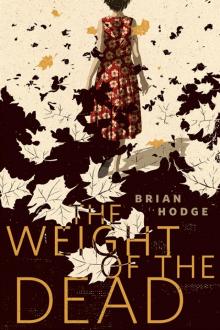 The Weight of the Dead
The Weight of the Dead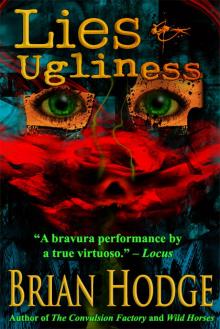 Lies & Ugliness
Lies & Ugliness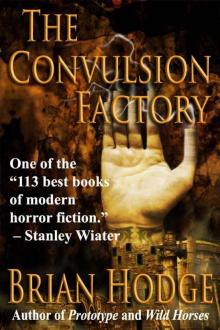 The Convulsion Factory
The Convulsion Factory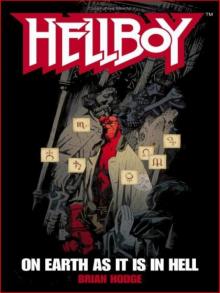 Hellboy: On Earth as It Is in Hell
Hellboy: On Earth as It Is in Hell Whom the Gods Would Destroy
Whom the Gods Would Destroy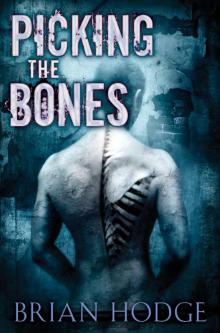 Picking the Bones
Picking the Bones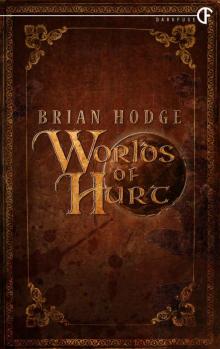 Worlds of Hurt
Worlds of Hurt Oasis
Oasis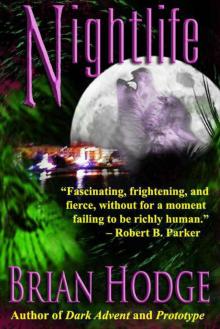 Nightlife
Nightlife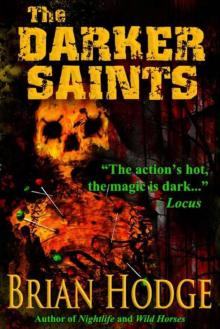 The Darker Saints
The Darker Saints Just Outside Our Windows, Deep Inside Our Walls
Just Outside Our Windows, Deep Inside Our Walls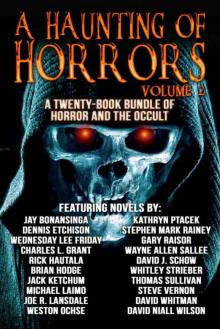 A Haunting of Horrors, Volume 2: A Twenty-Book eBook Bundle of Horror and the Occult
A Haunting of Horrors, Volume 2: A Twenty-Book eBook Bundle of Horror and the Occult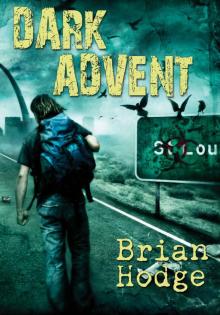 Dark Advent
Dark Advent Mad Dogs
Mad Dogs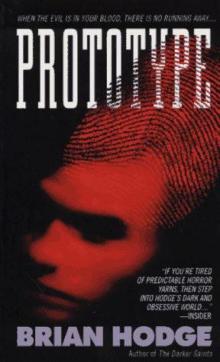 Prototype
Prototype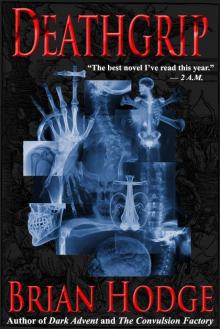 Deathgrip
Deathgrip Falling Idols
Falling Idols